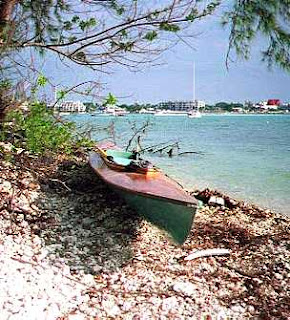 If you've visited Key West, Florida, you probably saw Wisteria Key. It's the Australian pine-covered island across the harbor from the waterfront hotels and Mallory Square, home of the famous "sunset celebration."
If you've visited Key West, Florida, you probably saw Wisteria Key. It's the Australian pine-covered island across the harbor from the waterfront hotels and Mallory Square, home of the famous "sunset celebration."The island was originally a "spoil bank," consisting of rock and sand dredged up a century ago in order to deepen Key West harbor. It came to be called Wisteria Key or Island after a ship that sank behind it. Eventually salt loving Australian pines took root, and the name Christmas Tree Island seemed more appropriate to locals.
 Over the years the island has been home to hippies, vagrants, boat bums and the just plain curious. At one time someone wanted to put a campsite for handicapped people out there, but the local politicians saw that as a ruse and nixed the idea.
Over the years the island has been home to hippies, vagrants, boat bums and the just plain curious. At one time someone wanted to put a campsite for handicapped people out there, but the local politicians saw that as a ruse and nixed the idea.Now comes a more serious challenge. The island's owners and their partners want to put a real estate development out there. A citizens' group is saying "enough," claiming that they've known for years what they could and could not do under the county's long-term comprehensive plan.
So the battle lines will be drawn over individual property rights vs. sticking to a plan devised to preserve a unique area with limited land space.
The issue also raises the question of whether allowing development of this island will permit the development of the many other offshore islands, most of which contain flora and fauna found only in this part of the USA.
 And of course there's the logistical problem of water, electricity, sewer connection and police and fire protection. The above picture is of a burning trailer on another offshore island, one of several torched by juveniles a few years ago. In that case there was no fire or police protection.
And of course there's the logistical problem of water, electricity, sewer connection and police and fire protection. The above picture is of a burning trailer on another offshore island, one of several torched by juveniles a few years ago. In that case there was no fire or police protection.Coffee shop gossip says that the details of water, electricity, and sewer have already been worked out for Wisteria Island.
Here's a link to a recent article on the island.
Update! The plans have hit a ripple. If history is any indication, they'll be back to try again, but this summer's efforts have been a bust. The natives are restless, and after the recent school board and land trust scandals, are "out for blood."

